CQ WEEKLY – COVER STORY
Dec. 22, 2011 – 11:53 a.m.
Campaigning on the Equity Card
By Joseph J. Schatz, CQ Staff
The richest Americans generally don’t have the loudest voices when it comes to politics — billionaires don’t have to shout to make their preferences known. But in recent months, as President Obama has cast the widening divide between the rich and the poor in the United States as unfair and unjust, prominent members of the “1 percent” have had an unusually public message for him: Cool it.
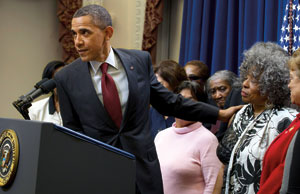
|
||
|
Ted Leonsis, owner of the Washington Capitals ice hockey team and a major donor to Obama’s 2008 primary campaign, took to his blog in September to complain about the president’s “class warfare” tactics. Noting that his father’s highest aspiration for him was to manage the produce department in the local grocery store — and that he paid off his college loans within five years of graduating — Leonsis complained that Democrats are “casting about for enemies, and anyone who has achieved success in terms of rank or fiscal success is being cast as a bad guy in a black hat.”
And a few weeks ago, billionaire hedge fund manager Leon Cooperman — the son of an immigrant couple from Poland and the product of P.S. 75, Morris High School and Hunter College in the Bronx — wrote an open letter to Obama, warning that his rich vs. poor rhetoric is “a naked, political pander to some of the basest human emotions — a strategy, as history teaches, that never ends well for anyone but totalitarians and anarchists.”
Leonsis and Cooperman acknowledge the struggles of the shrinking American middle class and might even support higher taxes on the wealthy. But for two self-made men who both contributed to Obama at some point, the president’s rhetoric is offensive. Although they are firmly in the 1 percent derided by Occupy Wall Street protesters, they reflect solidly middle-class attitudes about making it in America.
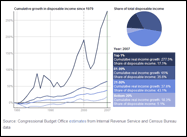
|
||
|
Their reactions to Obama demonstrate the hazards of using fairness or inequality or class as political themes during the next 11 months. For as long as researchers have studied public opinion on the subject, Americans have believed that economic inequality is a problem. Yet they have also demonstrated a high tolerance for it, as long as they feel that they, or their children, have an opportunity to someday become rich themselves. Such attitudes have helped Republicans pursue an agenda of deregulation and tax cuts in recent decades — with Democratic help.
The success of the politics of fairness in 2012, then, may depend on whether Americans still believe in that fundamental sense of opportunity; whether they agree with Obama that their ability to move up the ladder has been eroded; and, if so, whether they somehow blame the wealthy or policies favoring the wealthy for it.
It’s a tricky proposition for both parties, particularly Democrats, who seek to exploit the divide without turning off a class of voters that has long responded to optimism in its leaders and abhors the label “victim.” Republicans, meanwhile, need to determine whether their longstanding focus on opportunity, rather than inequality, is enough in this economic climate.
The challenge is reflected in a survey conducted this month by the Pew Research Center for the People & the Press. A large majority said the country unfairly favors the wealthy, and 40 percent of respondents said that “hard work and determination are no guarantee of success” in the United States — the highest figure in the 17 years that Pew has been asking.
Still, nearly 60 percent rejected the idea that American society is split into “haves” and “have-nots.”
“Americans are not opposed to inequality. What’s happened is the sense of magnitude . . . particularly that you can’t get ahead,” says Lawrence Jacobs, co-author of “Class War? What Americans Really Think about Economic Inequality” and a political science professor at the University of Minnesota’s Humphrey School of Public Affairs. “It’s a very powerful idea in America, that you could work hard and make your way up. . . . You want to have a shot at being Bill Gates.”
Obama, leaving behind a series of debilitating legislative debates, is now hitting at all of these themes, on all cylinders. He’s trying to make the case that economic fairness — in the tax code, in regulatory policy, on health care costs and labor protections — is crucial to the middle class and to the country’s future.
Campaigning on the Equity Card
People have strong personal views when it comes to things such as hard work and self-pity; that’s why the issues are so politically resonant. Obama and many congressional Democrats are betting that they will resonate with the voters — both in his base of minority supporters and educated liberals, and also among blue-collar whites — who may tip the balance next year.
“This is the defining issue of our time. This is a make-or-break moment for the middle class and for all those who are fighting to get into the middle class,” Obama said in a Dec. 6 speech in Osawatomie, Kan., designed to evoke memories of President Theodore Roosevelt’s “new nationalism” speech in 1910.
For Obama, it’s a much different message from 2008’s “hope and change.” Indeed, it’s easy to forget that, in the autumn of 2008, many voters turned to the young Illinois senator, and they delivered solid majorities in the House and Senate to the Democrats because he seemed the steadier hand amid the upheaval taking place around them in the financial markets. But three years later, with voters of all stripes still identifying the economy as their main concern, Obama can boast only of uneven job growth on his watch.
The issue flared up in the recent showdown on Capitol Hill over extending the expiring payroll tax cut. Republicans refused to entertain a Democratic proposal to pay for the tax break with a surtax on the super-rich, allowing Democrats to argue, for a few weeks at least, that Republicans were willing to raise taxes on middle-income voters but not on the wealthy.
Mobility Problem?
Economic fairness is a familiar issue, particularly for the Democratic Party, which built its New Deal and post–New Deal coalition around it. Bill Clinton and Bob Dole sparred over it in 1996. But the 1990s were boom times.
Obama’s message is tailored for a new era and a radically altered economy, in which corporate profits as a share of the economy are at a record high even as workers’ wages stagnate, while holiday sales of luxury goods are thriving even as many Americans remain unemployed and financially strapped.
Its potency derives from increasing questions about the size and durability of the great middle class since the income gap started widening in 1979.
Celinda Lake, president of Lake Research and a prominent Democratic strategist, notes that at one time 85 percent of Americans considered themselves part of the middle class. “People are afraid of falling out of the middle class,” she said, noting that the feeling is particularly strong in Ohio, Michigan, Pennsylvania and Missouri, battleground states with strong populist streaks and large populations of the types of voters Obama needs.
Although Democrats retain a polling advantage on “middle class” issues, Lake says, the party taps into it only intermittently. “Every issue we talk about, we’ve got to put it through this frame.”
Against the backdrop of a recovery that has yet to produce many jobs, seizing on the arguments of the Occupy Wall Street crowd may be the only feasible way for Democrats to frame their economic message, defend the White House and retain their small Senate majority. “I think [the Obama team] thought they were going to be able to run a very Ronald Reagan, ‘Morning in America’–type campaign,” says Rep.
Success for Democrats may depend on whether America remains a mobile society and, more important, whether Americans see it that way. The reality is difficult to measure, although an effort is being made by the Economic Mobility Project, run by the Pew Charitable Trusts in conjunction with ideologically diverse experts and think tanks, including the American Enterprise Institute, the Heritage Foundation, the Urban Institute, the Brookings Institution and the New America Foundation.
A recent survey by the project looked at mobility from two different perspectives. On the one hand, more than two-thirds of respondents earned more money than their parents did at the same age, adjusted for inflation. That was particularly true among the lowest-earning fifth of Americans, and it’s the measure that conservatives tend to focus on: “absolute” mobility.
Campaigning on the Equity Card
A different picture emerged when measuring people’s rank on the nation’s income distribution list compared with their parents’. At the highest and lowest ends of the distribution, people “are highly likely to look like their parents,” notes the project’s manager, Erin Currier. Forty-two percent of Americans whose parents were in the lowest income quintile remain there themselves; 39 percent whose parents were in the top quintile remain there. That’s the measure the political left tends to focus on.
And Americans are more concerned with mobility than with the actual income gap. In a 2009 poll conducted by the project, respondents said, by a 71-21 percent margin, that it’s more important to give people a chance to succeed than to reduce inequality. Americans care about a lack of upward mobility; “they’re not worried about people being wealthy,” says Currier.
Different Approach
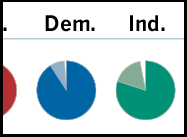
|
||
|
Those dynamics give Republicans an opening — and they’re using the mobility issue, too, but in a different way.
“Republicans are picking up from their constituents the same level [of concern] about America’s prospects and America’s opportunities that Democrats are but have a very different philosophical approach to addressing those concerns,” says Terry Holt, a Republican strategist who was national spokesman for the Bush-Cheney re-election campaign in 2004.
Holt says the inequality argument is too “esoteric” to be effective beyond the Democratic base. “There’s a ceiling to the effectiveness of a class-warfare argument,” he says. “I think it’s kind of a bank shot.”
Yet class warfare is an art in which Republicans are well-trained, particularly former House Speaker Newt Gingrich, the surprise front-runner as GOP presidential nominees prepare for the Iowa caucuses, in January. Unlike his main competitor, former Massachusetts Gov. Mitt Romney, Gingrich “understands how to tap into populism,” notes Democratic pollster Lake. It’s how he helped conservatives win back the House in 1994 and built support for overhauling the welfare system and other spending programs in the 1990s. “If we don’t tap into this divide, he’ll tap into it from his own perspective,” Lake predicted.
Gingrich referred to Obama, for example, as “the finest food stamp president” in history — and, after taking flak for the phrase, said it again.
And even though tea party populism may not be what it was in the run-up to the 2010 election, it remains a formidable force in the Republican Party.
Despite the GOP’s resistance to the Dodd-Frank financial regulatory overhaul, for instance, some conservative operatives have tried to seize the mantle of anti–Wall Street populism; see Crossroads GPS’s unlikely attempt earlier this month to paint anti-bank crusader and Massachusetts Senate candidate Elizabeth Warren as an ally of the big financial institutions. And the National Review, the magazine of the conservative intellectual establishment, ran a cover story in early December with a photo of actor Michael Douglas in his “Wall Street” role, tying the Obama administration to Wall Street cronyism.
While that may not ring true for some voters, it does for others. Lake says the “most damning” exit-poll statistic from the 2010 midterms was that “if you blamed Wall Street for the economy, you voted for the Republicans by double digits. That is what we have to reverse to win in the 2012 election.”
Moreover, Republicans have long counted on Americans’ ambivalence about inequality to advance their fiscal policies, particularly when it comes to taxes.
Campaigning on the Equity Card
House Budget Committee Chairman
Ryan noted that Treasury Department statistics show that from 1996 to 2005, economic growth meant rising incomes for most Americans and that the vast majority of successful entrepreneurs come from middle- or lower-class backgrounds. “Telling Americans they are stuck in their current station in life, that they are victims of circumstances beyond their control and that government’s role is to help them cope with it — well, that’s not who we are,” Ryan said. “That’s not what we do.”
Sen.
Rhetorical Challenge
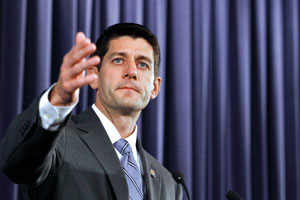
|
||
|
Therein lies one of the political and rhetorical challenges for top Democrats: whether they can exploit the divide in a way that doesn’t turn off voters, particularly middle-class independents.
That’s why Obama, in his speech in Kansas, cast the problem not only as one of inequality but also as one of opportunity and fairness.
“This kind of gaping inequality gives lie to the promise at the very heart of America: that this is the place where you can make it if you try,” he said. “And yet, over the last few decades, the rungs on the ladder of opportunity have grown farther and farther apart, and the middle class has shrunk.”
The speech drew high praise from
Schumer recently circulated a memo by Democratic pollster Geof Garin saying that recent polling “indicates that the Republican/tea party narrative about the economy has been superseded by a different narrative — one that emphasizes the need to address the growing gap between those at the very top of the economic ladder and the rest of the country.”
To Lake, the message is vital but the words matter. For instance, she says, the phrase “income inequality,” a key theme of “Occupy” protesters and liberal economists, triggers thoughts of poverty and debates over welfare. For voters who consider themselves middle-class, it feels “transactional,” Lake says.
Lake contends that Democrats should be focusing on the erosion of the middle class. “What’s really going on is really emotional,” she says. “It draws a picture that everyone can see.” Income inequality is “not as emotive to people and evocative to people.”
In 1990, Gingrich, as head of the GOPAC political action committee, used focus groups to test campaign language with voters. In one memo, his team noted the importance that Americans place on “hard work,” ranking it as a top basic American value. “These mostly middle-class citizens see many of the rich and many of those on welfare as benefiting from other than hard work,” the memo says.
Campaigning on the Equity Card
It’s an idea that the Obama team may want to take note of: that Americans don’t necessarily like to blame groups of people for their problems, unless they were found to be cheating. In many ways, it goes to the heart of what Leonsis and Cooperman are angry about: the demonization of successful businesspeople who followed the rules.
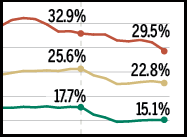
|
||
|
Some Democrats seem uncomfortable with overt appeals about the haves and have-nots in American society, lest they be seen as ignoring the more practical everyday economic difficulties many people face. “That’s more of a strategic question. It’s part of the debate, but I think we’ve got to focus on jobs,” says Sen.
Some centrist Democrats say the real fear is national decline. Income disparity “can scratch an itch. I don’t think it can take you over the goal line,” says Jim Kessler, a former Schumer aide who is now vice president of policy at the centrist think tank Third Way. “It rallies the base and makes Democrats feel like they’re on offense.”
Whether it appeals to the kind of middle-class swing voters who voted for Obama in 2008, voted Republican in 2010 and remain undecided for 2012 is unclear. And a message devoid of hope will not work, he says. “I think treating the middle class like they’re victims is an enormous mistake,” Kessler says. “This is not a victim-oriented class of people.”
Obama seems to get that. As he touted workplace protections for home health aides on Dec. 15, he used the words “hard work” repeatedly and told the story of Pauline Beck, a health aide he met on the campaign trail in 2008. “I also remember listening to her talk about the hardships in her life, and she did so without any self-pity,” he said. “She was glad to be working hard, and she was glad to be helping someone.”
It’s that kind of language from the president that may be the key to turning the academic issues of inequality and mobility into compelling campaign themes. “There’s clearly a higher level of interest” in those issues, says Glen Bolger, a Republican pollster and co-founder of Public Opinion Strategies. “The question is, does it translate to voting behavior. The jury is still out on that.”
Making the case in a way that energizes the Democratic base and wins over enough independent voters, without alienating key backers, may be difficult.
As Capitals owner Leonsis said in his blog posting, “Money still talks. It blows my mind when I am asked for money as a donation at the same time I am getting blasted as being a bad guy!”
Yet, for all its pitfalls, appealing to the economic divisions in American society can be effective. And Obama’s eventual opponent — and congressional Republicans — are now on notice.
“In a tough economy . . . it’s very easy to play the class-warfare card, and it works,” notes Rep. Cole. “We can’t ignore it or believe it doesn’t have political resonance, because it does.”
FOR FURTHER READING: Payroll tax debate, CQ Weekly 2011 p. 2604; Gingrich’s record, p. 2540; Crossroads goes after Warren, p. 2581; rearguing the social contract, p. 796; the tax code and inequality, 2009 CQ Weekly, p. 830.